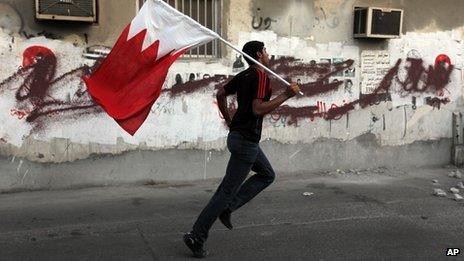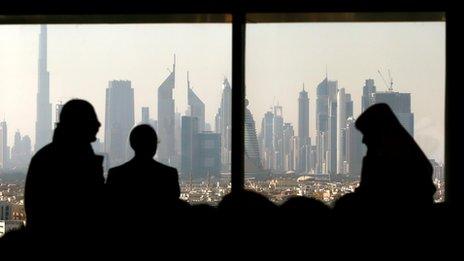Gulf states divided over Iran sanctions
- Published
Sheikh Mohammed Bin Rashid Al Maktoum speaks exclusively to the BBC's Jon Sopel in Dubai: ''Iran is our neighbour and we don't want any problem''
Dubai wants sanctions on Iran lifted. This is hardly surprising given that nearly half a million Iranians live in the United Arab Emirates (UAE) and that Dubai already benefits from a flourishing trade with its neighbour across the Gulf.
In a BBC interview aired on Monday, the ruler of Dubai, Sheikh Mohammed bin Rashid al-Maktoum, said that with Iran as a neighbour, everyone would benefit if a deal with the US resulted in sanctions being lifted.
"You see, Iran is our neighbour and we don't want any problem and they didn't have any problem," said the sheikh.
"But if they agree with the Americans and the Americans agree and lift their sanctions, everybody will benefit."
Sharply different view
But this is not a view shared by all of Dubai's Arab neighbours in the Gulf, many of whom continue to view Iran as a strategic threat.
The Saudis have let it be known they are opposed to "bringing Iran in from the cold" as part of the recently-brokered deal to curb Iran's nuclear activities.
They see sanctions as one way of curtailing any Iranian expansion and Riyadh has vowed to step up its support for Syria's rebel forces fighting Iran's ally, President Bashar al-Assad.
Bahrain accuses Iran of fuelling violent protests in its villages. It is currently investigating what it says is an Iranian plot to import weapons and explosives into the country after intercepting a boat laden with arms in late December.

Bahrain accuses Iran of stoking violent anti-government protests
Even Abu Dhabi, which alongside Dubai is one of the seven emirates making up the UAE, has a sharply different view on Iran from its more commercially minded neighbour, Dubai. As the capital of the UAE, it has been pushing for years to resolve the issue of three disputed islands in the Gulf, claimed by both the UAE and Iran but occupied by Iranian forces.
"Dubai and Abu Dhabi have always had differences of opinion on Iran," says a former British diplomat who worked in the Gulf.
"There is a huge Iranian community in Dubai, and huge trade there, so they take a different approach."
Thaw in relations
But further south, Oman will welcome the Dubai ruler's warm words towards Iran. As the country that hosted the secret talks between Iran and the US that led to the tentative breakthrough agreement in Geneva, Oman would like to see a thaw in Gulf Arab-Iranian relations.

Dubai has sought to become the financial gateway of the Middle East
Without the clout backed by huge oil reserves enjoyed by Saudi Arabia, UAE and Kuwait, Oman has often steered a middle course on foreign policy and was recently instrumental in securing the release of US citizens held by Iran.
All of this goes to show one thing: when it comes to Iran, the Gulf Arab states are very far from united.
Saudi Arabia has recently been pressing for a closer union of all six states that make up the Gulf Cooperation Council (GCC), with talk of a common foreign policy and a shared defence force.
Behind this lies Riyadh's fears of Iran's Revolutionary Guards Corps looking to export their Islamic Revolution across the Gulf and fomenting sectarian unrest between Sunni and Shia.
Kuwait, Bahrain and Abu Dhabi are open to the idea of a closer union but Qatar is wary and Oman has let it be known that if pressed, it will go its own way.
As for Dubai, the ruler's views on Iran are a reminder that what makes Dubai tick is not politics, it is trade, business and opportunity.